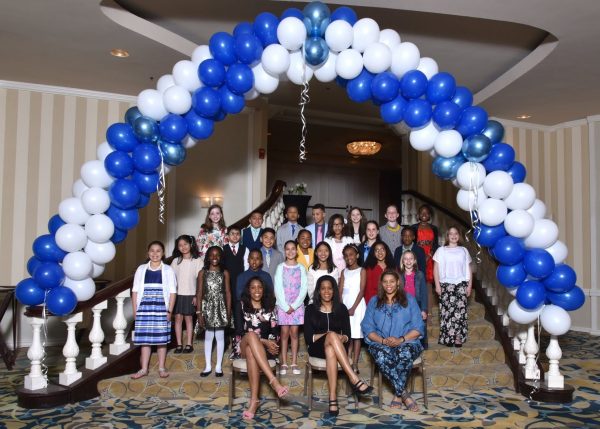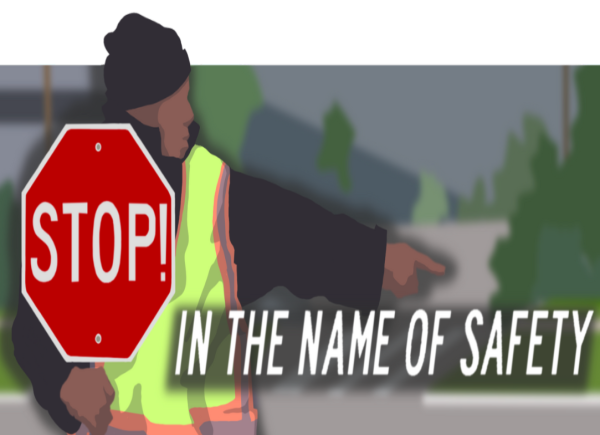Daycare lets young kids learn about the world and themselves
November 28, 2022
Standing in the planetarium courtyard, staff members and students together enjoy the gleeful mesmerized laughter of young children. Stunned and excited, they awe at the cock-a-doodle-do of the rooster living right in ETHS’ courtyard. They marvel at its red crown, golden feathers and long, clawed feet. With an up-close view of the unfamiliar colors and piercing scream, they quickly learn the excitement that comes with the revelation of a rooster.
This uncovering is only one of many new discoveries made during the hours at ETHS’ unique daycare facility. For ages three to five, an immersive, educational experience is provided for young Wildkits while their ETHS staff or teacher-parents work nearby.
Originally starting in the 1960’s as a two and a half hour program, the daycare was created to educate students of the Child Development class. Today it is a full-time program not only aiming to create interactive experiences for ETHS students but also focusing on developing creative and cognitive abilities for the children.
A typical day for a child at the daycare consists of structured activities, story time, outdoor play, nap time, and the much-loved arts and crafts. On special days, the kids enjoy field trips to the courtyard, trips to classrooms, and visits from the Child Development class. Sticking to a well-known area, while also exploring, allows the children to maintain a more comfortable disposition while also teaching them the importance of branching out.
Nancy Fuller, ETHS’ Child Care Center Coordinator speaks on the importance of the daycare to parent-teachers and staff.
“It provides an on-site Daycare center for ETHS staff, and it allows parents to bring their child to work with them; this is a convenience,” she says.
The parental benefits of the Daycare are extensive. Not only do parents appreciate the comfort of having their child in their workplace, but their children also get the educational benefits of interacting with older students.
Growing up, it is common to be given puzzles, blocks, coloring tools, and even books. These kinds of activities are intellectually stimulating and engaging. They begin the path towards gaining linguistic, motor and emotional skills, activating the prefrontal cortex of the child’s brain. The kids at the ETHS daycare are no different. Alba Vickers, a sophomore, partakes in visiting the Daycare as part of the Child Development elective. She explains the benefits of having hands-on experiences with children’s cognition and learning.
“What we did yesterday was free play, which includes playing with cars, trains, dolls, LEGOs, and painting. I think that some days when the weather looks a bit nicer, they go outside to their playground, but I know a lot of the activities they do are very cognitive-based, to help them develop a lot of their physical, emotional, and intellectual abilities.”
Throughout the day they are involved in many activities: sensory crafts, art, and storytelling. Even counting blocks, and admiring the graininess of playdough, introduces the ideas of science, math and social studies. These subjects are all taught to give the young children an opportunity to become familiar with the material before starting grade school. Different Child Development classes rotate through the day, allowing the children to develop social skills and a level of comfortability with change.
Change comes in many forms at the ETHS Daycare. Whether it be transitions between activities, outside versus inside play, new places to visit, or new people to meet, the young ones constantly learn a new way to deal with adjustments. A common unfamiliarity for the young Wildkits comes in meeting the new, much older students at the highschool. Charlie Henderson, a sophomore and Child Development student at ETHS, explains her first interaction with the children.
“We first had to go up to them and introduce ourselves,” Henderson says. “After a while, the students and kids begin to click. They end up going up to you when you walk in the room or they’re like, ‘come sit with me.’”
These young Wildkits also have opportunities to branch out with many engaging and pedagogical experiences, taking advantage of ETHS’ many resources. Sometimes ASL classes are visited during holidays, musical performances are given, poetry readings are attended and best of all, the planetarium is opened for the young kids to discover and enjoy the beautiful wonder of outer space.
These unique outings are not only enjoyed by the young children, but also by students at ETHS. Henderson shares one of her most memorable experiences with the children.
“Recently, they’ve been getting into swings. At first they weren’t really into it, but now, we have to have a timer on it. We got to encourage all those kids to try something new! There’s one kid, a four year old. He’s one of the older kids. He cries when he has to get off the swing.”
Teaching confidence and trying new things is valued by the Daycare. Throughout the day, opportunities are presented to the kids, giving them the chance to find out what kind of challenges they can face, and what they are passionate about. Acknowledging and understanding emotions is also an important aspect of the ETHS Daycare.
Vickers speaks about the way she deals with emotionally expressive children along with any children she converses with.
“Even though they don’t always understand a lot of what we’re saying and they may tend to be more emotional, they still understand a lot of the social cues that we have, because they observe. Kids are very good observers … So just by nodding your head, and just talking to them, asking them questions after they speak even if you don’t understand something that they said, or just saying, like, ‘Oh, that’s so cool’, or ‘oh my gosh did that actually happen to you!’ makes them feel like they’re being heard and seen.”
Even as a young child, feeling like you have a voice and a valid opinion provides a sense of reassurance especially when away from home and family. This moral is constantly stressed at the ETHS Daycare center and within the Child Development courses. Just these extra considerations for each child makes the ETHS Daycare a safe and welcoming space for all individuals.
“All students are able to explore careers related to early childhood/child development. They learn about developmental stages of growth, as well as educational theories, and they also learn how to develop age appropriate lessons for future practices either in careers or as future parents. Last but not least, the children benefit from being immersed in a social environment that is loving, nurturing, and educational,” Fuller concludes.
Students participating in the child development course greatly improve in their social abilities when working with all ages. They learn to portray a sense of comfort among younger grades while also experimenting with how to best teach and interact with a more youthful generation. This also creates a compassionate, affable atmosphere for the young Wildkits to grow and discover. Additionally the ETHS Daycare provides a trusted space for staff and teacher-parents to leave their loved ones. By creating a nourishing yet enriching environment for the young learners, they can grow to be confident in themselves as well as the community surrounding them.



















